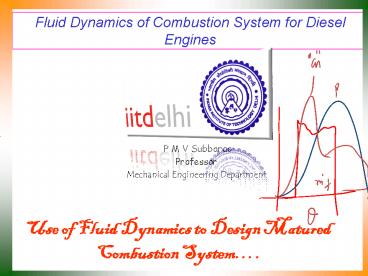Fluid Dynamics of Combustion System for Diesel Engines - PowerPoint PPT Presentation
1 / 15
Title:
Fluid Dynamics of Combustion System for Diesel Engines
Description:
... 250 m, and they are manufactured using a complicated EDM (Electro Discharge Machining) ... Calculation of gas properties Chemical equilibrium compositions. – PowerPoint PPT presentation
Number of Views:131
Avg rating:3.0/5.0
Title: Fluid Dynamics of Combustion System for Diesel Engines
1
Fluid Dynamics of Combustion System for Diesel
Engines
- P M V Subbarao
- Professor
- Mechanical Engineering Department
Use of Fluid Dynamics to Design Matured
Combustion System.
2
Schematic of Combustion in diesel Engine
3
The Design Algorithm to Facilitate Fluid Dynamics
- The basic concept of the design model is as
follows. - The fuel injected into a combustion chamber is
divided into many zones. - Events in each zone, such as droplet break-up,
evaporation, airfuel mixing, ignition,
heatrelease, heat transfer and formation of
exhaust emis are traced and calculated in order
to obtain zonal temperature and compositions. - The mass, internal energy and mole quantity of
NOx of every zone are calculated to obtain
cylinder-averaged temperature, airfuel ratio and
NOx concentration.
4
Fluid Dynamics FactorsGeometric Features
5
Spray development
- After fuel is injected into the cylinder, spray
break-up takes place in few crankshaft angles
followed by wall impingement. - In these stages, the movement of the fuel jet
follows different laws. - Before break-up, the jet follows the energy
conservation law and the intial velocity of jet
is as follows
6
Diesel fuel injection nozzles
Sac type
VCO-type
The holes in a modern injection system are very
small, typically 50 250 µm, and they are
manufactured using a complicated EDM (Electro
Discharge Machining) process.
7
Actuation of Injector Nozzle
8
Mass flow rate through Nozzle
9
Flow of Fuel through Finite Length Circular Pipe
10
Coefficient of Discharge
Nuricks Number, K
pv is the vapor pressure of the fuel.
11
Optimal Design of Nozzle Hole
12
(No Transcript)
13
Why Is It Happening?
14
Component of Design Model
- The Global design model contains the following
submodels - spray development,
- Air entrainment and mixing,
- Droplet evaporation,
- Heat transfer of a zone,
- Combustion and thermodynamic calculation,
- NOx formation,
- Calculation of gas properties
- Chemical equilibrium compositions.
15
Spray Formation
- Spray formation is explained as Breakup
Mechanism, described as - Stretching of fuel ligament into sheets or
streams. - Appearance of ripples and protuberances.
- Formation of small ligaments or holes in sheets.
- Collapse of ligaments or holes in sheets.
- Further breakup due to vibration of droplets.
- Agglomeration or shedding from large drops.
- The flow parameters of a jet
- Jet Reynolds number
- Jet weber number
- Ohnesorge number































